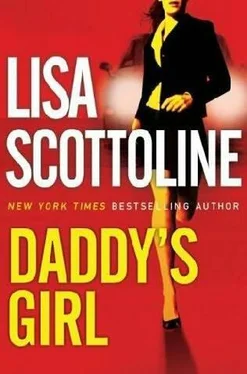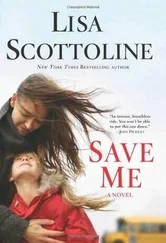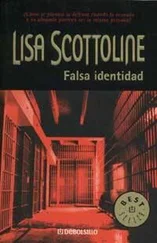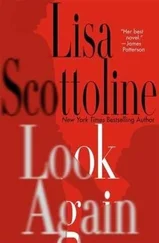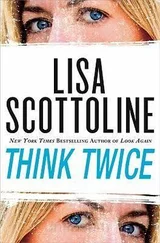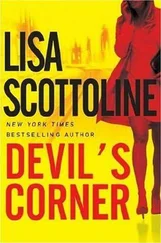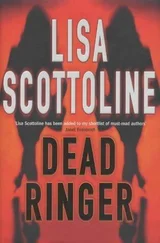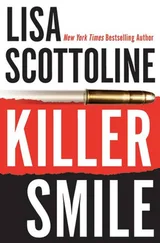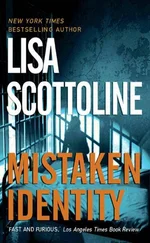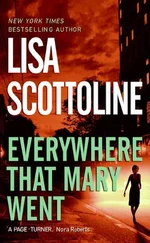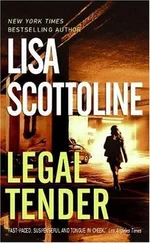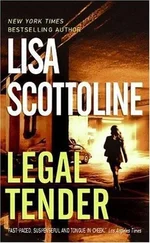"YOU GOT LUCKY!" they all said, then laughed.
"Happy Birthday to you, too, sis," Junior said, grinning crookedly, and Tom came over and gave her a quick kiss on the cheek.
"Thanks for the assist, professor."
"No sweat." Nat smiled. "By the way, I have some good news-"
"DAD, YOU SCREWED THE POOCH IN THE SECOND HOLE. IT WAS ALL DOWNHILL FROM THERE."
Tom shook his head. "That's not where he went wrong, you idiot. It was on the fifth, the second shot. I told him. The ball always takes a funny roll on the fairway there."
Junior snorted. "Wrong again. It was the sixth. I told him, go with the eight iron, but he went with the nine. I made twenty-five bucks and let him off easy. Easy"
"Shut up, everybody. You're all wrong." Her father raised his hand, and the boys fell silent.
Nat waited for Big John to pass judgment. The wrong iron. The wrong hole. The wrong whatever.
Her father said, "I think your sister was trying to say something. All of you boys shut up and let her talk."
Whoa. Nat blinked. For a minute, she forgot what she was going to say.
"SO TALK ALREADY!"
"Paul," her father warned, frowning, and her mother looked up.
Nat knew that look. Don't yell at Paul, dear.
But her mother said, "What's your news, honey?"
Nat looked from her mother to her father, and back again. Who were these people?
"Nat?" her father asked.
Nat eyed him with suspicion, but from all outward appearances, her father was listening. Eyes alert, face turned toward her, lips parted expectantly. She had seen people listening on TV, so she knew what it looked like. Even her mother had her head cocked, and held the knife poised over the melon. In fact, they were all listening. To her.
Nat answered, "My book about the Underground Railroad is going to be published. I submitted the outline and three chapters, and they made me an offer."
"That's terrific, kid!" her father said, giving her another big hug, and her mother came over for another one, too, this time without the knife.
"An author in the family!" she said. "I'm so proud!"
"Way to go, sis!" Junior said.
"Congratulations, Nat!" Tom called out, but the last word belonged to Paul.
"GREAT. NOW ON THE SECOND HOLE…"
Author's Note and Acknowledgments
I'm big on research, but this time I went to extremes. Whether it was because of my newly empty nest or a wish for a different intellectual challenge (yeah, right), I've begun teaching at the University of Pennsylvania Law School. That's right, Nat Greco's school employs me as an adjunct professor (read, Faculty Comic Relief), and her huge lecture hall is my own. My course isn't The History of Justice, but a course I developed called Justice and Fiction, which traces images of law and justice in books, movies, and TV. As a result, I know exactly what it feels like to stand before a class of students who are way smarter than me. (Surprisingly fun.) I hope that Daddy's Girl benefits from my walking in Nat's pumps and experiencing firsthand just how wonderful, and how difficult, it is to be a teacher. I am never more bone tired than after I teach, and it's given me renewed respect for every teacher I've ever had-and furthermore, every teacher on the planet. So my deepest thanks here go to teachers, for their sacrifice, commitment, and love. I'm glad to make a teacher my heroine, because they are heroes every day. This book is dedicated to them.
I also want to make clear where reality ends and fiction begins, so here comes the disclaimer. The University of Pennsylvania Law School is real, but all of the law school faculty, staff, administration, and students in this novel are completely fictional. The real law school dean, Dean Michael Fitts, is a brilliant legal scholar who has a genuine warmth and enthusiasm for the school, its faculty and staff, and the students. Dean Fitts redefines the modern law school dean, and the faculty and administration exemplify legal education in the United States. The real vice dean is my friend Jo-Anne Verrier, whom I hope forgives the bad press her job gets here. The administration and faculty have been nothing but kind to me, and no reader should mistake any of the fictional characters in Daddy's Girl for anyone at Penn Law. And as an alumna, I know it's the best law school in the country.
Equally important, the students in Daddy's Girl, while adorable, aren't the students in my class. Frankly, my kids rock. They're interested in learning and participate in class all the time, which has nothing to do with me and everything to do with their innate intellectual curiosity and the articulate expression of their own ideas. I did teach them The Merchant of Venice, for the reason Nat does, and they got the point instantly. Apologies and thanks to my students. You know I love you guys.
Because so many readers get their ideas about law and justice from fiction, it's important to me to get my facts straight. I couldn't do that without lots of help, cooperation, and time from experts, and any mistakes in the novel are mine. And again, in the disclaimer department, the so-called Chester County Correctional Institution in the novel is completely fictional, as are its staff and administration. To give verisimilitude to my fictional prison, I did research at an actual prison, Chester County Prison in Pocopson Township, and I want to thank the very professional and kind Major Scott Graham, Director of Security. He gave me a tour of the prison and helped me generally understand how county prisons work, even during my fictional riot herein, and I appreciate that so much. There is no such job as Assistant Warden, and none of the fictional personnel in this novel reflect any of the professional and caring administration or corrections officers at Chester County Prison. Of course, the inmates in the novel are fictional, too.
Thanks to an array of other law enforcement professionals in Chester County. Thanks to Lieutenant Brian Naylor of the Pennsylvania State Police, Embreeville Barracks, and a big hug of thanks and admiration to Sergeant Jill McKone, Avondale Barracks, who took the time to give me a complete tour, correct my trooperspeak, and explain in detail what would be obvious to anyone else. And thanks to Nicholas J. Casenta, Jr., Chief Deputy District Attorney, and Patrick Carmody, First Assistant District Attorney, both of the Chester County District Attorney's Office, for their time, expertise, and warmth. Thanks, too, to Detective Sergeant Jeffrey S. Gordon of the Chester County Detectives Office, for helping me understand local police procedures.
Thanks, as always, to my old friends Glenn Gilman, Esq., and retired detective Art Mee, for legal and police expertise. And thanks to new friends, the lovely and brilliant Dr. Felicia Lewis and my lifesaver Dr. John J. O'Hara. And to book maven Joe Drabyak, who always goes the extra mile-for books.
SPOILER ALERT: I owe an important thanks here, but you shouldn't read on if you haven't finished the book yet. What follows is a complete and total spoiler and will reveal a PLOT TWIST, so please don't read it now or it will ruin the surprise. In fact, cover the rest of the page with your hand because it would kill me if this was ruined for you. But I have to thank this person in print and want to explain why. So go finish the book and then come back. Please.
Thanks to historian Mary Dugan who educated me on the Underground Railroad in Chester County, Pennsylvania, and who devotes so much of her time to the Kennett Underground Railroad Center in Kennett Square, Pennsylvania. Let me take a minute to provide some background for those of you who need a short refresher on American history, or those from another country. The Underground Railroad existed and was most active from 1835 to 1865, during an awful chapter in American history when the slavery of African Americans was legal. Slaves were "owned" by many in the southern states, though it became illegal in the northern states. Slaves were often cruelly treated-forced to perform backbreaking labor and endure physical punishments and worse-and their families and children were often divided and sold to other owners. In time, many slaves became desperate for their basic right to live free and ran away to the northern states, placing themselves in legal and lethal jeopardy. They became fugitives from the law and were subject to punishment and even death if they were caught.
Читать дальше
